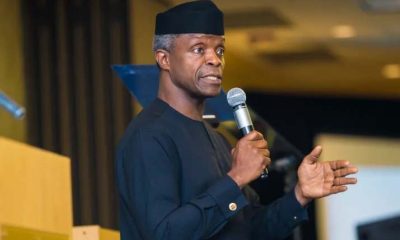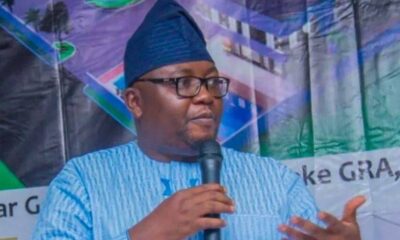Business
FG investing $2bn in power distribution, transmission through Siemens initiative – Osinbajo

The Federal Government is investing more than $2 billion under the Siemens Presidential Power Initiative to boost transmission and distribution of electricity from the nation’s national grid, Vice President Yemi Osinbajo has said.
Speaking during the formal inauguration of the National Council on Infrastructure in Abuja on Tuesday, the Vice President said the collaboration between the FG and the private sector would not only ensure effective coordination of the infrastructure development across the nation, and all sectors of the economy, but also bridge the nation’s infrastructural gaps.
Osinbajo’s spokesman, Laolu Akande, in a statement in Abuja, said the VP virtually inaugurated the National Council on Infrastructure set up by President Muhammadu Buhari.
Such collaboration will also bridge the nation’s infrastructure gaps, according to Osinbajo.
He said, “The administration is investing more than $2 billion in distribution and transmission through the Siemens Presidential Power Initiative, the Transmission, Rehabilitation and Expansion Plan, the CBN-financed Transmission-Distribution Interface Programme and the recently approved $500 million World Bank DISREP programme for the Distribution segment.
“For efficient and effective implementation of infrastructure projects, the National Integrated Infrastructure Master Plan (NIIMP) recommended the establishment of the National Council on Infrastructure and its Technical Working Group (TWG).”
Osinbajo said the FG’s NIIMP was developed to provide an integrated view of infrastructure development in Nigeria with clear linkages across key sectors, and identifies enablers for successful implementation in line with the current economic realities.
He stated, “The NIIMP takes stock of existing infrastructure and specifically sets out the goal of raising Nigeria’s infrastructure stock to at least 70 per cent by the year 2043.
“The success of the NIIMP will depend, to a large extent, on the establishment of a strong implementation mechanism and framework that promotes performance and accountability.
“The National Council on Infrastructure is to provide policy direction on infrastructure matters and drive the creation and sustenance of the expected synergy and linkages between the public and the private sector to enhance the implementation of the Infrastructure Master Plan.”
According to him, the Technical Working Group will provide guidance to the Council and advise on all infrastructure related matters.
Osinbajo said in spite of the infrastructure deficit across the country, there had been deliberate and massive investments in road, rail and power infrastructure for rapid economic development by the present administration.
According to him, a fundamental feature of the federal government’s plan for the rapid development of the economy is a deliberate and massive investment in infrastructure.
He said, “They include the Second Niger bridge, the Lagos-Ibadan expressway, the Abuja-Kaduna-Kano Road (funded through the Presidential Infrastructure Development Fund), the construction and upgrading of about 5,000km of major road projects across the country through the Sukuk bond.
“Rail sector investments include the Lagos Kano standard gauge lines, and the Warri-Itakpe rail.
“In the energy sector, this administration has green-lit NLNG Train 7, invested in the Ajaokuta-Kaduna-Kano (AKK) pipeline and is on track to complete an incremental 4,000MW of generating assets such as Zungeru Hydro and Kashimbilla Hydro to complement systemic reforms and investments in the distribution and transmission segments of the electricity value chain.”
The Vice President also highlighted the federal government’s N15 trillion Infrastructure Corporation (InfraCorp Nigeria) in 2021, the Reviewed National Integrated Infrastructure Master Plan (2020-2043) and the National Development Plan 2021-2025.
Osinbajo said the $2.3 trillion estimated resource requirement for the National Integrated Infrastructure Master Plan implementation was too large to be provided from public resources alone, even as he stated that a well-coordinated and strategic approach would be required to harness private resources to increase the stock of Nigeria’s infrastructure to the desired level by the year 2043.
Minister of State for Budget and National Planning, Clem Agba, thanked the vice president for his leadership and selfless service to the nation.
Private sector members of the new council include the President of the Manufacturers Association of Nigeria (MAN), Engr. Mansur Ahmed, and a representative of the Nigerian Society of Engineers (NSE), Engr Tasiu Wudil.
The Vice President is the chairman of the National Council on Infrastructure, and members include representatives of the state governors, federal ministers, heads of government agencies and members of the private sector.
Others are Governor of Ekiti State and chairman of the Nigeria Governors’ Forum, Kayode Fayemi; Minister of Finance, Budget and National Planning, Zainab Ahmed; and the Attorney General of the Federation and Minister of Justice, Abubakar Malami.
There are also ministers of Works, Babatunde Fashola; Power, Abubakar Aliyu; Transportation, Mu’azu Sambo; Communications and Digital Economy, Isa Pantami; Water Resources, Suleiman Adamu, and Aviation, Hadi Sirika; minister of State, Budget and National Planning, Clem Agba; CBN Governor, Godwin Emefiele; the President of MAN, Mansur Ahmed, and National President, Nigerian Association of Chambers of Commerce, Industry Mines and Agriculture (NACCIMA), John Udeagbala.
The Executive Vice Chairman, Federal Competition and Consumer Protection Commission (FCCPC), Babatunde Irukera, and managing director, Nigeria Sovereign Investment Authority (NSIA), Uche Orji, among others made the list.
Railway
Lagos Rail Mass Transit part of FG free train ride – NRC

Lagos Rail Mass Transit part of FG free train ride – NRC
The Nigerian Railway Corporation (NRC) has disclosed that the Lagos Rail Mass Transit (LRMT) trains are included in the Federal Government’s free train ride initiative for the Christmas and New Year celebrations.
The LRMT, which currently includes the Phase 1 Blue Line Rail and the Phase 1 of the Red Line Rail, operates under the Lagos Metropolitan Area Transport Authority (LAMATA).
This announcement was made by Ben Iloanusi, the Acting Managing Director of the NRC, during an interview on NTA News TV on Friday, following the launch of the initiative earlier that day.
While Iloanusi stated that Phase 1 of both the Blue Line and Red Line Rail projects are part of the program, LAMATA has yet to confirm this inclusion.
READ ALSO:
- Nigeria denies alleged plot to destabilise Niger Republic
- Navy arrests 19 Nigerians attempting to reach Europe by hiding on ship
- Troops arrest four Ambazonian rebels in Taraba
Iloanusi outlined the other routes benefiting from the scheme, which include the Lagos-Ibadan Train Service, Kaduna-Abuja Train Service, Warri-Itakpe Train Service, Port Harcourt-Aba Train Service, and the Bola Ahmed Tinubu Mass Transit in Lagos. Notably, little was previously known about the Bola Ahmed Tinubu Mass Transit service until this disclosure.
“Let me mention the routes where this free train service is happening. We have the Lagos-Ibadan Train Service, we have the Kaduna-Abuja Train Service, we have the Warri-Itakpe Train Service, we have the Lagos Rail Mass Transit trains, we have the Port Harcourt-Aba Train Service, and we have what we call the Bola Ahmed Tinubu Mass Transit, which is also in Lagos,” he stated.
Iloanusi provided operational updates, stating that passengers nationwide can access free tickets online or, for those unable to do so, at train stations where they will be profiled and validated.
He noted that passengers using NRC-managed services (excluding the Lagos Rail Mass Transit) should reserve tickets via the official website, www.nrc.gov.ng, with a valid ID required. He also advised travelers to plan, arrive on time, and bring valid identification.
Lagos Rail Mass Transit part of FG free train ride – NRC
Business
NNPC denies claim of Port Harcourt refinery shutdown

NNPC denies claim of Port Harcourt refinery shutdown
The Nigerian National Petroleum Company Limited (NNPCL) has denied claims in media reports that the newly refurbished Port Harcourt refinery has shut down.
The national oil company denied the claim in a press release issued by its Chief Corporate Communications Officer, Olufemi Soneye, on Saturday.
Soneye said the claim was false and urged Nigerians to disregard it. He stressed that the Port-Harcourt Refinery is fully operational.
READ ALSO:
- Like Ibadan, stampede claim 10 lives for Abuja Catholic church, 17 in Anambra
- Marketers react after NNPCL slashes petrol price to N899 per litre
- Electricity: We installed 184,507 meters, issued 50 licences in Q3, says FG
The statement read, “The attention of the Nigerian National Petroleum Company Limited (NNPC Ltd.) has been drawn to reports in a section of the media alleging that the Old Port Harcourt Refinery which was re-streamed two months ago has been shut down.
“We wish to clarify that such reports are totally false as the refinery is fully operational as verified a few days ago by former Group Managing Directors of NNPC.”
He noted that preparation for the day’s loading operation is currently ongoing, and added that claims of the shutdown are “figments of the imagination of those who want to create artificial scarcity and rip-off Nigerians.”
NNPC denies claim of Port Harcourt refinery shutdown
Business
CBN permits BDCs to buy up to $25,000 FX weekly from NFEM

CBN permits BDCs to buy up to $25,000 FX weekly from NFEM
The Central Bank of Nigeria (CBN) has granted Bureau de Change (BDC) operators temporary permission to purchase up to $25,000 weekly in foreign exchange (FX) from the Nigerian Foreign Exchange Market (NFEM).
The Central Bank of Nigeria (CBN) has granted Bureau de Change (BDC) operators temporary permission to purchase up to $25,000 weekly in foreign exchange (FX) from the Nigerian Foreign Exchange Market (NFEM).
This move, detailed in a circular dated December 19, 2024, is designed to meet seasonal retail demand for FX during the holiday period.
The circular was signed by T.G. Allu, on behalf of the Acting Director of the Trade and Exchange Department.
The arrangement will be in effect from December 19, 2024, to January 30, 2025.
Under the directive, BDCs may purchase FX from a single Authorized Dealer of their choice, provided they fully fund their accounts before accessing the market.
Transactions to occur at the prevailing NFEM rate
The transactions will occur at the prevailing NFEM rate, and BDCs are required to adhere to a maximum 1% spread when pricing FX for retail end-users.
READ ALSO:
- Badenoch’s negative portrayal of Nigeria Police unfair-PCRC
- Bitcoin price crashes to $95,000 as market continues to react to Federal rate cuts
- Bauchi high court dismisses blasphemy, cybercrime charges against Rhoda Jatau
All transactions conducted under this scheme must be reported to the CBN’s Trade and Exchange Department.
The circular read in part:
“In order to meet expected seasonal demand for foreign exchange, the CBN is allowing a temporary access for all existing BDCs to the NFEM for the purchase of FX from Authorised Dealers, subject to a weekly cap of USD 25,000.00 (Twenty-five thousand dollars only).
This window will be open between December 19, 2024 to January 30, 2025.
“BDC operators can purchase FX under this arrangement from only one Authorized Dealer of their choice and will be required to fully fund their account before accessing the market at the prevailing NFEM rate. All transactions with BDCs should be reported to the Trade and Exchange department, and a maximum spread of 1% is allowed on the pricing offered by BDCs to retail end-users.”
The CBN assured the general public that PTA (Personal Travel Allowance) and BTA (Business Travel Allowance) remain available through banks for legitimate travel and business needs.”
These transactions are to be conducted at “market-determined exchange rates” within the NFEM framework.
This initiative reflects the CBN’s strategy to stabilize the FX market and manage seasonal surges in demand.
CBN permits BDCs to buy up to $25,000 FX weekly from NFEM
-

 Railway1 day ago
Railway1 day agoLagos Rail Mass Transit part of FG free train ride – NRC
-

 metro16 hours ago
metro16 hours agoWhy we displayed ‘Jesus Christ is not God’ banner at Lekki mosque -Imam
-

 metro2 days ago
metro2 days agoCourt stops customs from seizing imported rice in open market
-

 metro3 days ago
metro3 days agoIbadan stampede: Tinubu orders probe as death toll hits 40
-

 metro2 days ago
metro2 days agoIbadan stampede: Ooni reacts after arrest of ex-wife
-

 metro3 days ago
metro3 days agoAfe Babalola: Court grants Dele Farotimi bail, barred from media interviews
-

 metro1 day ago
metro1 day agoNIMC warns against extortion, reaffirms free NIN enrollment
-

 News3 days ago
News3 days agoAdebayo Ogunlesi, 2 other Nigerians make Forbes 50 wealthiest Black Americans list 2024











